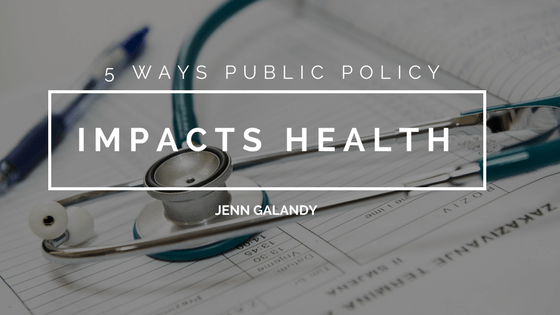Having equal access to health care is critical, but not the only factor that influences health policy. The state of our physical, social and economic environments play a large part in our wellbeing. Policy changes can improve community well being by reducing or eliminating unhealthy conditions as well as encourage changes that promote individual and community health efforts. Below are five ways that the creation of public policy can impact health.
1. Creation and Regulation of Public Goods
Public policy can help to create and maintain public goods, such as roads and highways. The frequent use of these roads as well as any additional factors, (weather, urbanization, aging roadways) can make these roads hazardous for use. If roads are inadequate for use or unaccessible individuals are less likely to access the health care services they need. Some individuals may even forego medical treatment due to the lack of transportation infrastructure.
According to Transport Canada, “these challenges increase pressure for more federal, provincial and municipal spending at a time when economic and financial circumstances are forcing all governments to consider new and innovative ways to fund transportation infrastructure”. Without the regulation of public goods like highways, the public will have a more difficult time accessing the care services they need.
2. Protecting Natural Resources
From the air we breathe to the water we drink, public health can become vulnerable to consuming pollutants in the environment. Contaminants like lead, heavy metals, and pesticides can lead to damaging effects of the nervous system, vital organs, and can even lead cancer. In Canada, the Canadian Environmental Protection Act, 1999 became the foundation of environmental legislation and continues to play an essential role in protecting the environment and human health.
3. Mandates to Protect Citizens
Vehicle crashes have been one of the leading causes of death. To help alleviate this issue, mandatory seat belt laws have been put into place. Acts like the Alberta Traffic Safety Act enforces drivers and passengers to fasten seatbelts or else face a fine starting at $155. By enforcing this mandate, fatal vehicle crashes have decreased over time.
4. Prepares Future Generation
One way that public policy can create opportunities and reduce barriers is to improve the education system. Creating an education system that adequately prepares children for the future will help in securing better jobs, which in return will benefit their future livelihood. New Brunswick’s launch of The Labour Force and Development Strategy aims to provide an easier transition into the workforce to providing student with the knowledge and skills to pursue a career path.
5. Access to Health Care
Providing accessible health care is one of the most obvious ways public policy impacts health. Although the public’s health is impacted in more ways than one, having accessible healthcare remains an important aspect in maintaining health efforts.
Accessible health care allows the public to have treatment to injuries and illness that helps increase the longevity of lives. The Canada Health Act of 1984, provides free and universal insured healthcare to the citizens of Canada. Under this act, citizens of Canada do not have to worry whether or not they can afford the medical support they need.
All in all, public policy remains to be a powerful tool in encouraging the wellbeing of others and their health.
